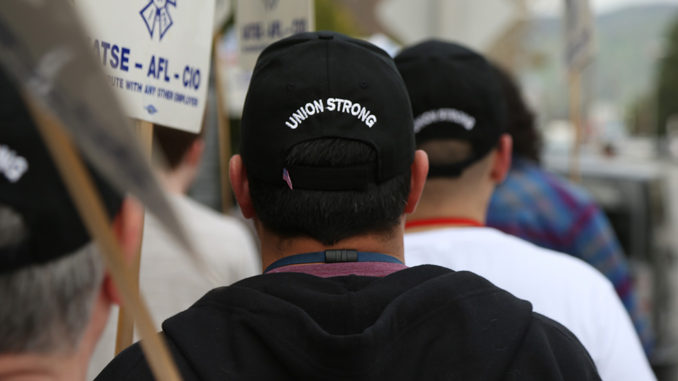
By Rob Callahan

If you have paid much attention to the news in recent months, you know that organized labor throughout the US faces an onslaught of historic ferocity and scope. In the most thoroughly reported attack, Wisconsin’s governor has moved to strip public employees of their long-standing rights to collective bargaining.
But the attacks do not end in Wisconsin. Politicians in Ohio, Indiana and other states either intend to enact, or have already passed, similar measures. So-called “right to work” bills (legislation that outlaws union security clauses, thereby effectively discouraging employees from joining unions) have been introduced in a slew of state legislatures. New Jersey’s governor has refused to negotiate with state workers over health benefits. A number of congressmen have attempted (unsuccessfully) to defund the National Labor Relations Board, the agency charged with protecting employees’ right to organize. Costa Mesa, California has laid off its unionized municipal employees en masse in order to privatize city services. The list goes on.
Most of us understand why these attacks matter to us. As union members, we instinctively comprehend the principle voiced in the venerable labor motto, “An injury to one is an injury to all.” That’s why, on Saturday, March 26, thousands of union members and allies––including scores from the Editors Guild and hundreds from the IATSE––took to the streets of downtown Los Angeles. The event, dubbed Solidarity Saturday, was a march and rally to demonstrate that LA’s supporters of labor will stand together and fight back. Unions throughout the Los Angeles area came out in strength, and the Editors Guild stood shoulder to shoulder with them.
While most of us comprehend our connection to employees under attack elsewhere, I was moved to write this column because not quite everyone does. As we were mobilizing for Solidarity Saturday, I received an e-mail from a disgruntled sound editor who suggested that we have no business involving ourselves in other unions’ fights. He made clear that he objected to the Guild’s pro-labor agenda, and he stated that he would happily renounce his Guild membership, were it not for the great health benefits he receives as a function of our union contracts. This individual rejected the principle of solidarity, even as he enjoyed the fruits of that principle. For his benefit, and the benefit of others who might not see how the current wave of anti-union activity affects us, I decided to address the topic here.
Most, but not all, of the recent attacks upon organized labor have specifically targeted public employees. And most, but not all, of these attacks have taken place far from California and New York, where the bulk of Guild membership works. So why should we care? If a high school math teacher in Milwaukee has her health benefits slashed, what does that matter to a re-recording mixer in Burbank? If a firefighter in Cleveland loses his right to collective bargaining, how does that affect an assistant editor in Culver City? What do we really have at stake in these fights?
So our solidarity is not merely altruistic. It’s a recognition that we, ultimately, will help pay the costs for losses that employees elsewhere in the economy incur.
We have a lot at stake. Negotiations do not take place in a vacuum, but in the atmosphere of the broader marketplace. Indeed, years of falling standards within the overall labor market have fueled the current efforts to roll back state and municipal employees’ union contracts. Wherever public employees have been pressured to make concessions in bargaining, or have been threatened with the loss of their bargaining rights, the argument used against them has been much the same: These public workers have cushy jobs with lavish benefits far exceeding what most American workers receive. Health insurance paid for fully by one’s employer? Nobody gets that anymore. A defined benefit pension plan? A relic from another era.
The economic losses of workers in the private sector––losses mirroring the precipitous decline in private-sector union membership––are being harnessed to pressure public-sector workers to similarly cede ground. With exaggerated stories of kindergarten teachers’ lavish lifestyles, anti-union zealots attempt to arouse jealousy and to pit one group of employees against another. It’s a distraction from the fact that we’re all in the same boat…and that boat is sinking. As a report from the Economic Policy Institute states, “Recent debates about whether public- or private-sector workers earn more have obscured a larger truth: All workers have suffered from decades of stagnating wages despite large gains in productivity.”
If labor’s enemies and their divide-and-conquer tactics succeed in forcing public-sector workers nationwide to make painful concessions this year, such concessions will establish the context in which we begin our own contract negotiations for a successor agreement; our current IATSE-AMPTP Basic Agreement expires next summer. We will have a much harder time holding on to our excellent health and retirement benefits in an atmosphere in which others are surrendering theirs. Even without an environment poisoned by widespread union defeats, we have many reasons to anticipate that our upcoming negotiations will prove especially challenging. Givebacks made by our sister unions will only strengthen employers’ argument that they can simply no longer be expected to bear the cost of expensive benefits.
So our solidarity is not merely altruistic. It’s a recognition that we, ultimately, will help pay the costs for losses that employees elsewhere in the economy incur. Thankfully, working women and men nationwide have recognized the gravity of the fights in Wisconsin and elsewhere, and the labor movement has begun to coalesce and mobilize to an extent without precedent in recent history. From the statehouse in Madison to the streets of downtown LA, working folks are outraged and electrified. And people wield real power when they come together, take action and raise their voices in a chorus of protest.
Negotiations do not take place in a vacuum, but in the atmosphere of the broader marketplace.
The months to come will determine whether historians look back upon this year as one in which a labor movement already in slow decline suffered devastating additional setbacks, or one in which a movement bounced back reinvigorated and more powerful for having weathered its opponents’ overreaching attacks. Let us seize this moment to make history through our solidarity.
To find out how you can help resist the nationwide wave of anti-union attacks, visit the AFL-CIO’s “We Are One” Facebook page, www.facebook.com/ werunited. Follow the struggles of and events within our local labor community at the LA County Federation of Labor’s Facebook page, www.facebook.com/thelafed/.






